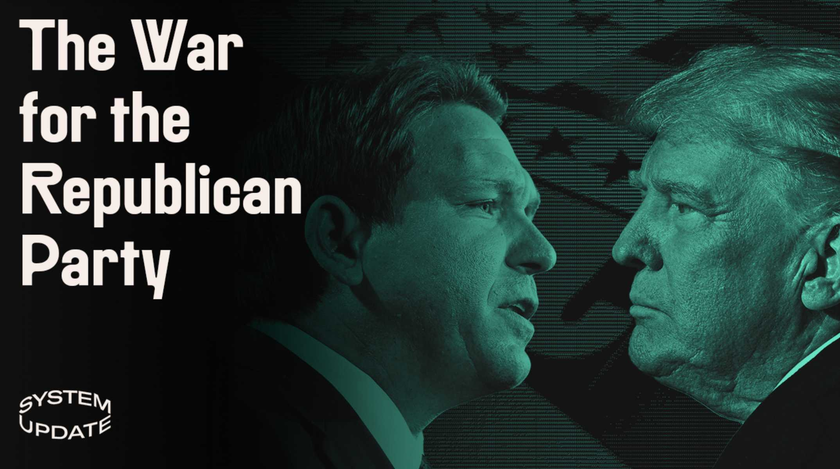Note From Glenn Greenwald: The following is the full show transcript, for subscribers only, of a recent episode of our System Update program, broadcast live on Rumble on Thursday, February 9, 2023. Watch the full episode of System Update Episode #38 Here on Rumble.
In this episode: Is the Republican Party plotting to return to its decades-old establishment dogma on both foreign and economic policy that prevailed before the emergence of Donald Trump? We'll review just how radical many of Trump's rejections of bipartisan consensus were because many of those, by design, have been buried under a relentless orgy of hysteria about allegiance to the Kremlin and The Insurrection and the circus that was created around Trump. However, what Trump accomplished in the 2016 primary – winning while rejecting most long standing Republican and Democratic orthodoxies on key issues – was quite stunning. And now the question is whether the GOP's embrace of him was done because of that ideological heresy or despite it.
For our interview segment, we'll speak to Josh Hammer, the Opinion Page editor of Newsweek, who has an important and provocative article this week asking that question: whether the GOP is preparing to move as far away from Trump as possible to ensure that its candidate, like the Democratic Party nominee, Biden or whomever, supports the same establishment dogma that everyone in power in D.C. has always supported.
As a reminder, System Update is now available in podcast form on Spotify, Apple, and other popular podcast platforms. Just follow System Update on whichever platform you use. You'll be notified when the new episode is posted, which will always be the day following our live broadcast right here on Rumble.
For now, welcome to a new episode of System Update starting right now.
Monologue:
The Trump campaign of 2016 was full of consequential and surprising challenges to bipartisan orthodoxy. Much of that has been forgotten because his campaign and the first two years of his presidency were drowned by the CIA- manufactured Russiagate scandal and the accompanying Mueller investigation, while the latter part of his presidency and post-presidency have been dominated by the events of January 6 and various attempts to prosecute Trump, or at least render him ineligible to run again.
All of those scandals and circus distractions served – I think, at least partially by design – to obscure his very aberrational frontal attacks on the key prongs of bipartisan consensus: that too party, or UniParty, the dogma that has ruled Washington for years. Trump's ability to deliver to the Mitch McConnell-led establishment wing of the Republican Party their key priorities – tax cuts for large corporations and three solidly conservative Supreme Court judges – made them willing to go along with many of Trump's heterodox and sometimes-threatening views, especially since they were often able to weaponize old school establishment Republican figures from within – such as Mike Pompeo, Nikki Haley and John Bolton – along with a string of career military officers who ended up embedded in the administration – such as John Kelly, James Mattis and H.R. McMaster – all to subvert many of the policy goals Trump wanted that were anathema to that D.C. consensus.
We should not allow that years-long D.C. war to either distract from Trump's abandonment of GOP orthodoxy or actively to subvert it; to make us forget how unexpected Trump's 2016 victory really was and what a radical change it represented, not just stylistically, but to the long standing prongs of core Republican ideology.























